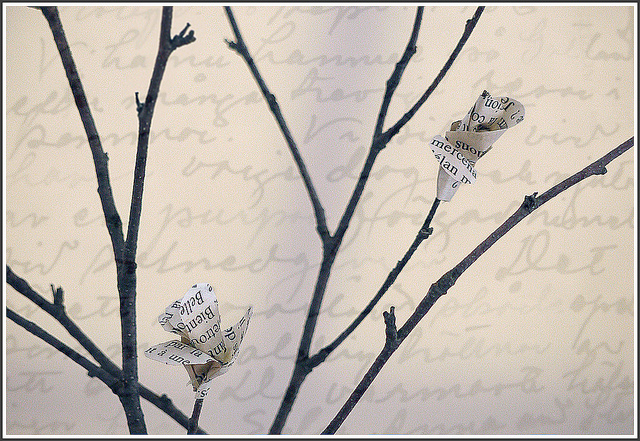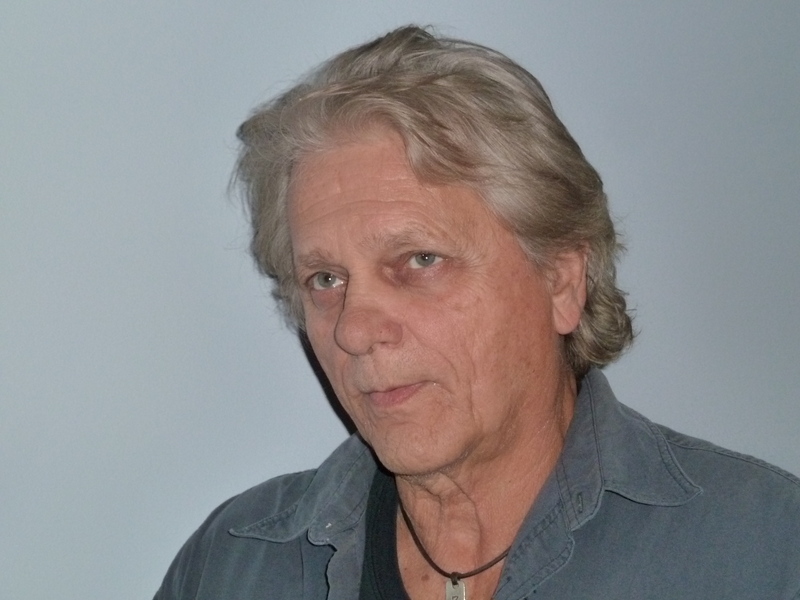Essay by William Horwath
What I Keep in My Line Cellar

Some guys, after they retire, play golf. My friend Randy flies drones. Seinfeld types move to Florida for the 4 o’clock blue-hair specials. Me, I do lines.
I’m A Man of Leisure, rather like the hero of an eighteenth-century English novel. After years in the classroom teaching Hardy and Trollope and Joyce, followed by decades writing Ford Truck copy in Detroit, I have no work that needs doing, no ad campaigns to generate, no meetings to attend, no classes to prepare, no exams to grade, no papers to read, no suppers to share with a wife, no children to fuss over, no one to care for but me.
So, most evenings, with flowers on the table and candles lit, I have a romantic dinner for one. And then I do lines. Not New York snow. Not the white stuff that eats your nose and jump-starts your blood, but just lines—lines from my favorite novels, plays, poems, films. Lines from books, lines from life. Lines that never stop bouncing around in my mind, never stop reminding me that I am not, or ever was, alone.
Plangent lines like this one from my old friend Jiggs McConnell, who on his eighty-fifth birthday said to me over the phone:
I have nothing to look forward to but the past.
When I heard that line ten years ago, I laughed. Who wouldn’t? But I had no idea what it really meant until today. With my seventy-fifth birthday just down the block, it amuses yet terrorizes me. Lines like that? Be careful. They can be addictive.
I could do worse. I could do what old “Bachelor” Robert Herrick did in his dank Devon vicarage back in the seventeenth century. Like him, I could rock in my chair while recounting the names of my former mistresses—Stately Julia, Smooth Anthea, Sweet Electra, Myrrha for the lute and voice, Corinna for her wit. I could end like Herrick, lamenting love’s loss:
…all are gone;
Only Herrick’s left alone,
For to number sorrows by
Their departures hence, and die.
But I won’t. Not while I have my lines. My lines keep me going. They people my life. Each has gone into the making of Will Horwath. Each entertains and consoles me. Each opens a world—different from, but the same as—my own. Sometimes, they teach me all I’ve ever needed to know about how to get on from day to day, how to keep body and soul together.
Let us stifle under mud at the pond’s edge
and affirm that it is fitting
and delicious to lose everything.
That’s from Donald Hall’s poem “Affirmation.” A friend since grad school, Don has never told me anything but the truth, even if I gag on it.
Oh, Jake, we could have had such a damned good time together.
From The Sun Also Rises by Hemingway. Che mala fortuna, Mr. Barnes. And me, too. There were so many loves I might have had, if it weren’t for this or for that; if only he weren’t in the picture─or her─or them─or it. If only we could have met at another time or somewhere else. If only. If only. If only.
I thought that love would last forever: I was wrong.
From “Twelve Songs” by W.H. Auden. We traded Eliot for him. It’s life’s most painful truth; in Four Weddings and a Funeral, it’s the kick in the nuts no one saw coming.
The flour is goon, there is namore to telle.
Even Chaucer’s Wife of Bath got old, yet made the most of a diminished thing.
Lust and learning. That’s really all there is, isn’t it?
From John Williams’s novel Stoner─there is namore to telle.
You should have been with us that day round the chowder-kettle.
From “Song of Myself.” Everyone should have had a Walt Whitman in his or her life. Just for the fun of it. I did; his name was Pete. And even though he’s dead, I drank a jar with him last night. We went to the bullfights in Malaga once and then to Fez. We stayed drunk for a month.
Lines don’t come cheap or easy. It just sounds as if they do. If they did, we'd all have reams of our own making, ready to use any time we needed one. But we don’t. Truth is, they’re damned hard to come by, as Yeats reminded us in “Adam’s Curse”:
I said, "A line may take us hours maybe;
Yet if it does not seem a moment’s thought,
Our stitching and unstitching has been naught."
Great lines have what Renaissance Italy called sprezzatura. They possess a certain nonchalance. They have a quality about them, like courtiers, of making it all seem effortless. As if they were just tossed off, “a moment’s thought,” autumn leaves from a tree.
In your time, have you raked up any of these?
- His eyes were green as leeks.
- Fool’d and beguil’d, by him thou, I by thee.
- It was Christmas at Camelot.
- A bottle of wine was good company.
- I saw morning harden upon the wall.
- Make me forget her name.
- They don’t know me anymore.
- I never can forget ’ee, for you was a good man, and did good things!
- We have heard the chimes at midnight.
- I saw something nasty in the woodshed.
- Ha! I like not that.
- Must get a bit stale, I should think.
- Deserve’s got nothing to do with it.
- I know thee not, old man.
- But then there was a star danced, and under that was I born.
- It is a terrible thing for a man to find out suddenly that all his life he has been speaking nothing but the truth. Can you forgive me?
• • •
My lines are like the bottles in my wine cellar. I think you can tell by tasting which are my favorite vineyards, which grapes I prefer. Like bottles of wine, good lines have to be properly kept, at the right temperature in a dark room. And a good line, like a good bottle, is always best shared with friends.
Here’s one from “Chateau” University of Michigan. It had a lot of promise when young, and has grown in body over the years.
Ann Arbor, 1965, the start of my first semester. Up for a graduate assistantship, I was sitting in the office of the department chair, Warner Rice, as he interviewed me for an assignment.
Mr. Horwath, I see here that you wrote your senior thesis on Robert Frost. Why him?
I’m an ex-paratrooper. I think Frost would have made a good Airborne Ranger. He’s tough and talks about life as it is, like in “Out, Out─.” He’s as rugged as Ragged Mountain in New Hampshire.
New Hampshire? I have just the man for you then. A New Hampshireman. And a poet.
Then, standing with his back to me, musing out over the Diag, he said:
I’m going to give you to Donald Hall.
A vintage line—Chateau Petrus. The crown jewel of my cellar.
Key to the Line Cellar
- Thisbe over the dead body of Pyramus in William Shakespeare’s A Midsummer Night’s Dream.
- Adam to Eve in John Milton’s Paradise Lost.
- From Sir Gawain and the Green Knight (modern verse translation by Simon Armitage).
- Jake Barnes in Ernest Hemingway’s The Sun Also Rises.
- Thomas Hardy on the death of his wife Emma in his poem “The Going.”
- Thomas Hardy in his poem “The Ballad Singer.”
- Willy Loman to his boss in Arthur Miller’s Death of a Salesman.
- Marty South at Giles Winterbourne’s grave in Thomas Hardy’s The Woodlanders.
- Jack Falstaff in William Shakespeare’s Henry IV (II).
- Aunt Ada Doom’s nonsensical mantra in Stella Gibbons’s novel Cold Comfort Farm.
- Iago to Othello, after having seen Cassio come out of Desdemona’s apartment in William Shakespeare’s Othello. A lie, of course, and the beginning of the Moor’s end.
- Ignatius Gallaher to Little Chandler in James Joyce’s “A Little Cloud” from Dubliners. He’s referring to sex with a wife.
- Clint Eastwood (William Munny) to Gene Hackman (“Little Bill”) before shooting him between the eyes in Unforgiven.
- Prince Hal (now King Henry V) killing Falstaff’s heart in Henry IV (II).
- Beatrice to Don Pedro in William Shakespeare’s Much Ado About Nothing.
- Jack to Gwendolen in Oscar Wilde’s The Importance of Being Earnest.
Art Information
- "Floraison de Mots (3)" © Louise Leclerc; Creative Commons license.
 William Horwath, ex-paratrooper, was born in Longswamp, Pennsylvania. A graduate of Moravian College and the University of Michigan, Will spent his professional life in advertising at J. Walter Thompson. Currently an adjunct at Madonna University in Livonia, Michigan, he shares his life at the sign of the Speckled Shin with his Spanish guitars and three friends: Shakespeare, Hardy, and Hemingway.
William Horwath, ex-paratrooper, was born in Longswamp, Pennsylvania. A graduate of Moravian College and the University of Michigan, Will spent his professional life in advertising at J. Walter Thompson. Currently an adjunct at Madonna University in Livonia, Michigan, he shares his life at the sign of the Speckled Shin with his Spanish guitars and three friends: Shakespeare, Hardy, and Hemingway.
